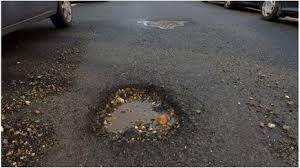The Word on Detroit’s Streets: Roads Are Bad, Hiking Taxes to Fix Them Would Be Worse
On the streets of metro Detroit, the road-funding ballot initiative known as Proposal 1 faces a bumpy path.

Michigan voters head to the polls next Tuesday to decide whether to increase the sales tax from six to seven percent, in part to pay for fixing the state’s deteriorating roadways.
But on the streets of metro Detroit the ballot initiative known as Proposal 1 faces a bumpy road.
That’s apparent as a taxi cab turns onto a sparsely-populated stretch of Warren Avenue in Detroit. The aged pavement is broken, patched and pitted with potholes.
It’s an obstacle course cab driver Mark McMillan says can easily become dangerous.
“Sometimes you almost get hit because people’s coming into your lane to get away from a pothole,” he said. “Bus driver told me it tore up a dual-tire bus. They had to tow the bus. Buses are getting broke down because of it.”
So McMillan says he favors Proposal 1, which would raise more than $1 billion for road repairs. But because it includes an appropriation of funds the proposal could not be repealed at the ballot box. Ever.
McMillan says that bothers him almost as much as the broken roadways.
“They make it bulletproof. If we’re a democracy why can’t we vote on it?”
The idea of paying any additional taxes in a city with Detroit’s high poverty and unemployment rates rankles people like Dwayne James.
He’s pumping gas into his car at a station on the city’s Eight Mile Road, frowning as the price continues to mount before him. Fuel at the pump would be exempt from a tax hike under Proposal 1.
But James says money is tight in Detroit. And the last thing he wants to see is a ballot initiative that would increase the overall sales tax by about $2 billion.
James says, “I disagree with anything that has to do with raising our taxes. I think there’s a better way we can get our roads fixed, maybe take different funds maybe from the federal government or state funds laying around for different programs that have to do with the roads. I know our roads are important. But raising the taxes? That’s just not that important.”
If Proposal 1 is approved it would actually create a tax break for some lower-income residents, plus provide hundreds of millions of dollars to fund schools, public transit and municipalities across the state.
Yet in Macomb County, Roseville resident John Michajlyszyn says the ballot measure seems to him like one more attempt to gain money from those least able to afford it.
“I think they could draw tax money from other areas, maybe not so much from the middle class or the lower class, maybe the upper class to pay for the roads. It just doesn’t seem like too much is getting done with any kind of politicians or Congress or anything lately. It’s a money issue like it always has been and nothing much is getting done,” he said.
That sense of mistrust comes up time and again in this completely unscientific survey of Metro Detroit voters.
Governor Snyder has been on an advertising blitz to tout Proposal 1.
Still voters like Nicole Johnson remain undecided.
At a gas station in Detroit’s Midtown, Johnson wonders what’s happening to the revenue Michigan already has in its coffers and why, after years of trying to devise a long-term strategy for road funding, a tax increase is the best the governor and the legislature can do.
Johnson said, “If I see some progress in the roads… but we don’t see none in the roads. So I can’t choose a side. Because we got money, as far as I’m concerned. They haven’t been using it. We have people that’s appointed to do these things for us and they still not doing. So It’s hard to trust them.”
Recent polling shows voters are ready to reject Proposal 1 – perhaps by a significant margin.
But polling can be wrong.
As the old saying goes, only death and taxes are true certainties.
The question in Michigan now is whether a tax increase, or crumbling roads, should be added to that list.
